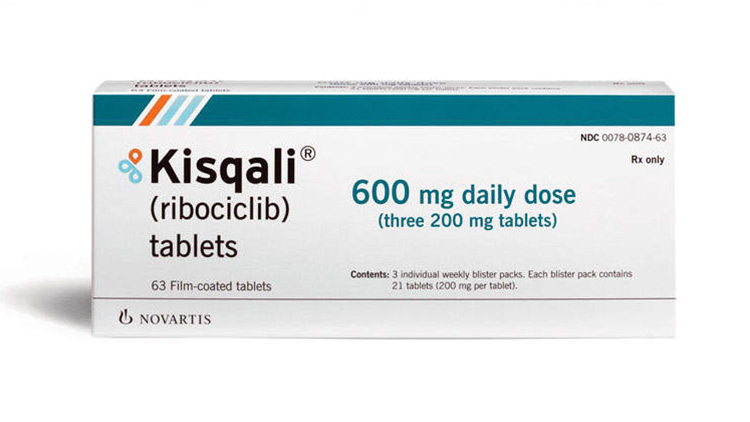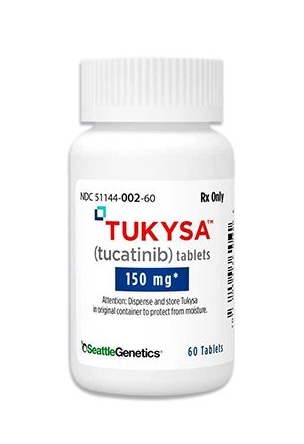Kisqali (ribociclib) vs Tukysa (tucatinib)
Kisqali (ribociclib) vs Tukysa (tucatinib)
Kisqali (ribociclib) is a CDK4/6 inhibitor primarily used in combination with hormone therapy for the treatment of HR-positive, HER2-negative advanced or metastatic breast cancer. Tukysa (tucatinib), on the other hand, is a tyrosine kinase inhibitor that targets HER2-positive breast cancer, often used in combination with other drugs like trastuzumab and capecitabine. The choice between Kisqali and Tukysa would depend on the specific breast cancer subtype a patient has, as Kisqali is not indicated for HER2-positive tumors, whereas Tukysa is specifically designed to target them.
Difference between Kisqali and Tukysa
| Metric | Kisqali (ribociclib) | Tukysa (tucatinib) |
|---|---|---|
| Generic name | Ribociclib | Tucatinib |
| Indications | HR-positive, HER2-negative advanced or metastatic breast cancer | HER2-positive breast cancer |
| Mechanism of action | CDK4/6 inhibitor | Tyrosine kinase inhibitor |
| Brand names | Kisqali | Tukysa |
| Administrative route | Oral | Oral |
| Side effects | Neutropenia, nausea, infections, fatigue, diarrhea | Diarrhea, palmar-plantar erythrodysesthesia, nausea, fatigue, hepatotoxicity |
| Contraindications | Known hypersensitivity to ribociclib or any of its excipients, QT prolongation, liver impairment | Known hypersensitivity to tucatinib or any of its excipients |
| Drug class | Antineoplastic agent, kinase inhibitor | Antineoplastic agent, kinase inhibitor |
| Manufacturer | Novartis Pharmaceuticals | Seagen Inc. |
Efficacy
Efficacy of Kisqali (Ribociclib) in Breast Cancer
Kisqali (ribociclib) is a targeted therapy known as a cyclin-dependent kinase 4/6 (CDK4/6) inhibitor, which is used in the treatment of certain types of breast cancer. Specifically, it is indicated for the treatment of hormone receptor-positive (HR+), human epidermal growth factor receptor 2-negative (HER2-) advanced or metastatic breast cancer. The efficacy of Kisqali has been demonstrated in multiple clinical trials. In these studies, ribociclib, in combination with an aromatase inhibitor or fulvestrant, has been shown to significantly improve progression-free survival (PFS) compared to the aromatase inhibitor or fulvestrant alone. This improvement in PFS indicates that ribociclib effectively delays the progression of the disease in the studied population.
One of the pivotal trials that supported the approval of Kisqali was the MONALEESA-2 trial. In this study, postmenopausal women with HR+/HER2- advanced breast cancer who had received no prior therapy for advanced disease were treated with ribociclib in combination with letrozole. The combination treatment resulted in a significant improvement in median PFS compared to letrozole alone. Subsequent trials, such as MONALEESA-7 and MONALEESA-3, have also supported the efficacy of ribociclib in premenopausal women and in combination with fulvestrant, respectively.
Efficacy of Tukysa (Tucatinib) in Breast Cancer
Tukysa (tucatinib) is an oral tyrosine kinase inhibitor that is specifically designed to target HER2, a protein that can promote the growth of cancer cells. For patients with HER2-positive breast cancer, tucatinib has been shown to be an effective treatment option. The approval of Tukysa was based on the results of the HER2CLIMB trial, which included patients with HER2-positive advanced or metastatic breast cancer, including those with brain metastases. In this trial, tucatinib, in combination with trastuzumab and capecitabine, demonstrated a significant improvement in PFS and overall survival (OS) compared to trastuzumab and capecitabine alone.
The HER2CLIMB trial was particularly noteworthy for including patients with brain metastases, a group often excluded from clinical trials. The addition of tucatinib to the standard treatment regimen was found to reduce the risk of disease progression or death in the overall population and also showed a reduction in the risk of disease progression or death in patients with brain metastases. These results indicate that tucatinib is an effective option for patients with HER2-positive breast cancer, addressing an unmet need for patients with brain metastases from this disease.
Regulatory Agency Approvals
Kisqali
-
European Medical Agency (EMA), European Union

-
Food and Drug Administration (FDA), USA

-
Health Canada

-
Therapeutic Goods Administration (TGA), Australia

-
Medsafe (NZ)

Tukysa
-
European Medical Agency (EMA), European Union

-
Food and Drug Administration (FDA), USA

-
Health Canada

-
Therapeutic Goods Administration (TGA), Australia

-
Swissmedic (CH)

Access Kisqali or Tukysa today
If Kisqali or Tukysa are not approved or available in your country (e.g. due to supply issues), you can access them via Everyone.org.
How it works

Make an enquiry
Choose the medicine you want to buy, answer a couple of questions, and upload your prescription to speed things up. We’ll get back to you within 24 hours.


Make an enquiry
Choose the medicine you want to buy, answer a couple of questions, and upload your prescription to speed things up. We’ll get back to you within 24 hours.


Breeze through the paperwork
We'll guide you through the required documents for importing unapproved medicine, ensuring you have all the necessary information.


Get a personalized quote
We’ll prepare a quote for you, including medicine costs and any shipping, administrative, or import fees that may apply.


Receive your medicine
Accept the quote and we’ll handle the rest - sourcing and safely delivering your medicine.

Some text on this page has been automatically generated. Speak to your physician before you start a new treatment or medication.
Let's talk
If you have any questions, call us or send us a message through WhatsApp or email:
Contact us




